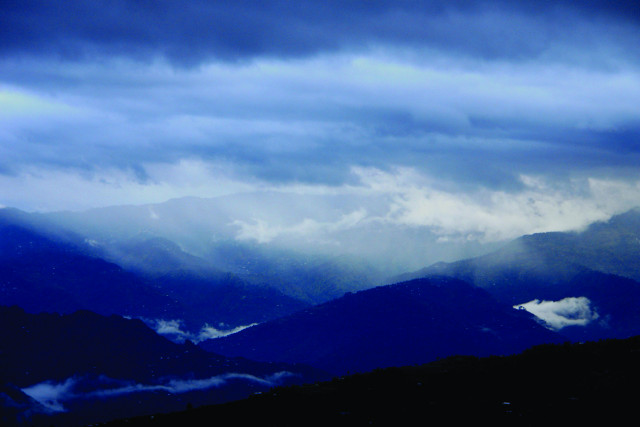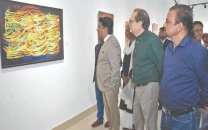Lost in the flood
The heaviest rains in about 80 years and I still have a roof over my head, still have a home, am still ‘here’.

The freezer: stuffed to the gunnels with garden produce et al is firmly shut. Not to be opened unless it begins to thaw in which case the entire mountainside community will enjoy a bonanza. The heaviest rains for at least 80 years and I still have a roof over my head, still have a home, am still ‘here’. I’m lucky. Extremely lucky. The landslide in the orchard can be cleared, a pick axe and shovel job. The ‘extra’ earth will come in handy and the cascade of boulders should be enough to construct a new terrace-retaining wall. The deluge, at its height, was both ferocious and, I openly admit, frightening.The main road leading to Azad Kashmir rings around this precipitous mountainside way down below my eyrie. It is silently devoid of traffic. The usual distant sound of speeding engines, of horns, replaced by the roaring rush of a rain fed waterfall: this is some distance away, knifing through thick forest on a distant ridge where the new scar of a landslide had etched a dull red path through the green of the trees, possibly cutting a link road in its flight. Miles away, right down at the bottom of the valley is the Jhelum River marking the borderline between this Punjabi outpost and Azad Kashmir. From here I see a short stretch of narrow ribbon alternating between grey-blue and silver depending on the light and the time of day. Right now, though, I see a monstrous heaving turbulence of rampaging brown laced with white caps. The river is in high flood and has obviously burst its banks. I wonder at the devastation both in its wake and lying ahead, particularly when it meets up with ‘civilisation’. Muzzafarabad, round the shoulder of the mountain and thus out of sight, must be devastated.
The main road, from the plains up to Murree, onwards from Murree to Bhurban, is closed I’m told. Landslides. The main power line snapped. Landslides again. It could, according to the telephone lineman, be another two or three days until it’s back in action.
My cell battery is almost dead. Switched off. Saved for an emergency.
The sun, a weak, watery, pale lemon shimmer peered through drifting curtains of clammy mist for a while this morning. It’s gone now. Beat a rapid retreat in the face of mounting purple-grey clouds massing for yet another assault from a northerly direction. The stand-by light may, or may not, last another evening. I have plenty of candles in reserve, four dozen at least, red ones, white ones, blue ones and a couple of lavender scented ones to create an aura of calmness. I haven’t seen a living soul for three days now. Have only spoken to the lineman via my cell phone. Everyone is huddled in their scattered houses waiting for the rain to cease when, as per routine, the silence will be broken by the thudding echo of hammers on corrugated iron roofs as leaks are fixed to the background shrieks of children splashing in puddles.
I’m told that Pindi is in chaos: all low-lying areas under water, houses flooded, swept away. That Leh Nullah has burst its banks to inundate vast swathes of the city with putrid garbage, industrial effluent, raw sewerage and worse and I wonder at the stupidity of the human race. The people living alongside this monstrous storm drain know full well, they’ve had enough previous experience to understand the danger it poses, that, come hell and high water, it will burst its banks, will sweep all, including humans, in its relentless path, will result in the catastrophe it just has. The people there will yell and scream, will expect and get urgent relief, will not be left empty handed. Someone, the government, philanthropists, politicians looking for votes, will ensure it is forthcoming and, as the poisonous liquid filth reverts to roiling normalcy, sluggishly complacent in its straightjacket, evilly anticipating the next torrential downpour, the recently displaced populace will continue to feed its malignant maw with an endless stream of garbage, thus ensuring a repeat performance of all they have just endured.
Then there is the matter of the countless thousands, over a million is the staggering figure I have now heard, of flood affected people in other parts of the country: Khyber Pakhtunkhwa, Balochistan, the Rajanpur area of Punjab being prime examples. Primarily reliant on irrigated agriculture as they are mostly living adjacent to water sources, in this case rivers, obviously has a certain attraction, an all too often ‘lethal attraction’ as it turns out as they, along with their crops, livestock and homes are routinely swept away when monsoon season comes around. It doesn’t take Einstein to figure out that teeming millions of people in Pakistan eke out a fraught existence: They are either screaming ‘drought’ or, as they are right now, ‘flood’ and yet, looking at this scenario from a historical perspective, the picture was completely different.
True, three hundred, two hundred, a hundred years ago population density was far less but people weren’t washed out of the nooks and crannies of their ‘narrow’ existence every single time monsoons hit the bucolic scene. They much preferred, eminently sensibly it appears, to farm the lowlands whilst building their villages and havelis on any rocky promontory in the vicinity. The ancient Buddhists inhabiting Alai Valley north-east of Battagram for example, cultivated crops including rice in low lying, riverine valleys but lived on high ground for safety.
Also, and this is where ‘work ethic’ enters the equation. The indigenous generations prior to Partition were, without exception, wise enough to both harvest and store water in times of plenty thus ensuring survival during periods of drought.
‘Foggaras’, also known as ‘Karez’ and ‘Qanat’, is an all but extinct method of water harvesting utilising excavated underground storage systems linked to underground distribution channels. Mainly fed by hill streams, this ingenious system drastically reduced storm water volume by harvesting its peak discharge for later use, any excess slowly leaching in to sub-soil aquifers. Being underground little precious water is lost to evaporation. Solely reliant on gravity for water distribution, Foggaras maintained the agricultural fertility of vast areas of what is now, the current crop of humans being too lazy to maintain them, inhospitable desert.
Then there was the ‘Rod Kohi’ rain water harvesting technique much used in upland regions and known as ‘Zams’ in Baluchistan. These linked systems of channels, lined with natural stone for endurance, led from streams and rivers subject to snow melt or monsoon abundance, into cultivable fields which were then flooded. The water slowly seeped into the ground and, once soil and climatic conditions were suitable, was sown with seasonal crops that had no further need of irrigation. Brilliant!
If we hadn’t ruthlessly plundered the natural world — this is something we Pakistanis are particularly expert at — hadn’t knocked everything out of balance, didn’t increasingly look down on hard, manual labour and took at least a modicum of pride in craftsmanship, surely we wouldn’t be in the dire straits we are? Perhaps we need to look to the past in order to build a sustainable future; a future in which one works in harmony with nature, rather than forcibly against? Perhaps then, in an ideal world anyway, people would celebrate heavy rainfall rather than fear it.
My mountain musings seem to have got the better of me this evening but, as the power has finally and miraculously reappeared, I must now go and check the hard won contents of the freezer with fingers well and truly crossed.
Published in The Express Tribune, August 8th, 2010.



















COMMENTS
Comments are moderated and generally will be posted if they are on-topic and not abusive.
For more information, please see our Comments FAQ